| Srl | Item |
| 1 |
ID:
187116
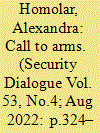

|
|
|
|
|
| Summary/Abstract |
The rhetoric leaders use to speak to domestic audiences about security is not simply bluster. Political agents rely upon stories of enmity and threat to represent what is happening in the international arena, to whom and why, in order to push national and international security policy agendas. They do so for the simple reason that a good story is a powerful political device. This article examines historical ‘calls to arms’ in the United States, based on insights from archival research at US presidential libraries and the United States National Archives. Drawing on narrative theory and political psychology, the article develops a new analytic framework to explain the political currency and staying power of hero–villain security narratives, which divide the world into opposing spheres of ‘good’ and ‘evil’. Shifting the conceptual focus away from speakers and settings towards audience and affect, it argues that the resonance of hero–villain security narratives lies in the way their plot structure keeps the audience in suspense. Because they are consequential rhetorical tools that shape security policy practices, the stories political agents tell about security demand greater attention in the broader field of international security studies.
|
|
|
|
|
|
|
|
|
|
|
|
|
|
|
|
| 2 |
ID:
138119
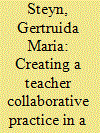

|
|
|
|
|
| Summary/Abstract |
This study focused on the experiences of a principal in developing a collaborative practice for teachers in his school. A qualitative research design was employed to determine the views of the principal in initiating and maintaining a collaborative culture in the primary school. A narrative analysis was used to analyse the data. The findings show the necessity of supportive leadership, how important it is for teachers to share their intellectual property and the benefit of creating supportive conditions for teacher collaboration. The study provides a tentative theoretical framework for a better understanding of the role of leadership in teacher collaboration and suggestions for teachers who would like to develop practical learning communities in their schools.
|
|
|
|
|
|
|
|
|
|
|
|
|
|
|
|
| 3 |
ID:
133255
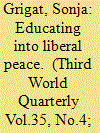

|
|
|
|
|
| Publication |
2014.
|
| Summary/Abstract |
Indonesia has seen excessive political violence in the first years since the end of autocratic rule under former president Suharto. Documented violence has ranged from separatist struggle to communal strife to terrorist attacks. The International Crisis Group (icg) has reported extensively on the conflicts underlying this violence and has formulated policy advice on how to overcome them. While the icg's reports on Indonesia have been acknowledged for their detailed and accurate account of micro-level violence, their recommendations reveal their political objectives. The icg's panacea for overcoming violent conflicts is institution building and security sector reform, which are centrepieces of the 'standard programme' of liberal peace- and state building. However, it is not only its policy advice but all the icg's publications in general that aim to diffuse the liberal governance agenda. This article argues that, through the narrative technique of epideictic oratory, the icg is aiming to educate its audience into a liberal governmentality characterised by practices and procedures which effect a de-politicisation of violence, foster liberal forms of governance and self-government and thus contribute to sustaining liberalism as a global 'regime of power'.
|
|
|
|
|
|
|
|
|
|
|
|
|
|
|
|
| 4 |
ID:
190821
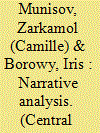

|
|
|
|
|
| Summary/Abstract |
This study examines contemporary poems on the Aral Sea crisis. Labelling them Russophone, the authors argue that the Russian language holds its status of lingua franca for the poets concerned about the environmental disaster in Central Asia. In these poems, the Aral Sea has become a central metaphor for the catastrophe that transcends the original case. The depiction of the diverse environmental issues caused by expanded irrigation policies in Soviet Central Asia provides favourable conditions to study these verses primarily from an ecopoetic perspective. Though these poems address one problem, the narrative form remains diverse: some authors apply various images; others personify the Aral Sea. In these verses the desert image acquires an unorthodox interpretation, while the personification of the Aral Sea in the poems reinforces the prior ecopoetry studies. This article investigates the poems’ content, historical background and anthropogenic effects on nature that pushed their authors to write them.
|
|
|
|
|
|
|
|
|
|
|
|
|
|
|
|
| 5 |
ID:
171919
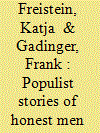

|
|
|
|
|
| Summary/Abstract |
This article proposes the methodological framework of visual narrative analysis through the study of images and narratives. We are interested in the appeal of political storytelling. In applying an approach of layered interpretation, we study images and slogans to consider the more complex underlying narratives in their political and cultural context. Our exploratory case studies draw on material from right-wing populist parties, namely election campaign posters from Germany and the UK as material for the analysis. We find that narratives operate with a ‘fantasmatic logic’, which adds fantasy to politics, to depoliticise and camouflage their radical intent and gain approval by making consent desirable. We identify two exemplary narratives (honest men under threat; proud mothers) that entrench traditional gender roles in accordance with patriarchy and nationalism. Theoretically, our approach contributes to debates in IR on cultural underpinnings in international politics and the construction of collective identities through shared/divided narratives. Visual narrative analysis provides a promising methodological tool for analysing visual representations in their productive relationship with text. This perspective foregrounds the power of political storytelling through fantasmatic appeal and fosters a better understanding of the global rise of populism.
|
|
|
|
|
|
|
|
|
|
|
|
|
|
|
|
| 6 |
ID:
190800
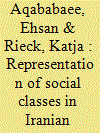

|
|
|
|
|
| Summary/Abstract |
This article discusses how social class was depicted in Iranian cinema during the Reformist Era between 2001 and 2005 when the government of Mohammad Khatami advocated economic reforms and cultural liberalization. The agenda of the Khatami government was supported by the middle and upper classes who had modernist cultural attitudes and benefitted from these political and economic reforms. The articles also analyzes how reformist ideology operated through films by presenting a positive image of the modernist middle and upper classes while challenging the values of the traditional classes and portraying the lower class as victims of social problems. The findings indicate that the reformists, contrary to their slogans, sought to normalize the values of their supporter classes in Iranian cinema.
|
|
|
|
|
|
|
|
|
|
|
|
|
|
|
|